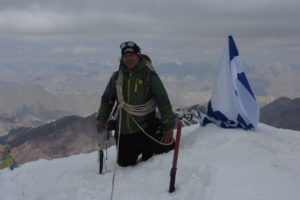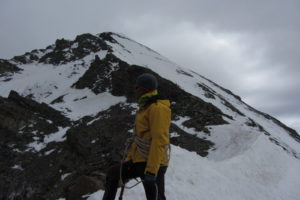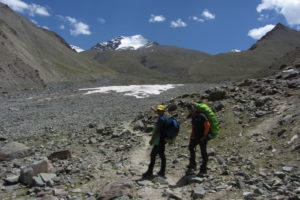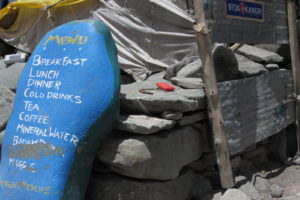



+91-9419333393
cwangdus@gmail.com
Do not hesitate to give us a call. We are an expert team and we are happy to talk to you.
+91-9419333393, +91-9469867272, +91-(0)1982- 255223
cwangdus@gmail.com




Stok Kangri stands very close to Leh and is named after the Stok village. Stok Kangri Trek is more than just a trek. It is an adventure where you will be challenged physically, emotionally and psychologically. Stok Kangri is the most fascinating trek of Ladhak region that appeals trekkers worldwide. The view of majestic Tran-Himalayan Range sometimes walking in between rows of wild flowers or sometime walking in the deserted and barren land provides the world class experience to the trekker.
NOTE:-
Stok Kangri expedition can be combined with Markha valley trek for better acclimatization.
All the itineraries can be customized to suit your own special interests, preferences, abilities, extension and reduction of numbers of days.
Board a flight to Leh from Delhi airport. On arriving at the Kushok Bakula airport, Leh (3500 m), meet our tour representative. Get assistance for transfer to the hotel. Complete the check-in formalities as you savour your welcome drink. Settle in your rooms. The day is for resting and getting acclimatized to the high altitudes of Ladakh. Before any journey across this place, acclimatization is necessary. In the evening, walk up to the local market to spot the hustle bustle and shanti stupa. O/N hotel
After breakfast drive to Lamayuru enroute magnetic hill, visit Likir, also known as lu-Khyil gompa, the Likir Monastery was ordered to build by the 5th king of Ladakh Lhachen Gyalpo and was thus founded by Lama Duwang Chosje in 1065. The monastery is of the Gelugpa sect of Tibetan Buddhism and visit Alchi temple Renowned as the oldest Buddhist learning centre, the Alchi Gompa is one of the magnificently built monasteries in Ladakh. Located 70 kilometres west of Leh on the banks of the Indus River, it is also the largest and most famous of the gompas built by Tibetan translator Rinchen Zangpo IN 11TH CENTURY, continue drive to visit the mesmerizing Moon landscapes and the Lamayuru monastery renowned as Tharpa Ling which means the ‘place of freedom’; Arahat Nimagon blessed the site and Mahasiddha Naropa founded the monastrery in the 11th century and Lamayuru is one of the oldest monasteries in Ladakh . (optional) If the weather permits, gear up for river rafting in River Zanskar. O/N hotel
After the Breakfast drive to Leh, visit Rizong, according to popular belief, Guru Padmasambhava along with other lamas used to meditate in the caves around Rizong in isolation, surviving on two times meal a day and avoiding any contact with the outside world. Before building the monastery in 1831, Lama Tsultim Nima started a hermitage at the site to teach monks about Buddhism, visit a nunnery, known as Chulichan (Chomoling), is under the cover of the monastery, where 20 nuns or the Chomos reside and worship at the temples of the monastery, perform chores like milking, spinning wool and getting oil for the temple lamps. Arrive at Leh by evening. O/N hotel
Morning drive to Stok village is about 15 kms from Leh. Start walking from the trekking point along the stream. It is long and cumbersome walk through the valley. There are many shepherd camps in the different entrances of the sub valleys. The Mankarmo Camp is at the point from where the valley turns southward. It is possible to trek up to the first base camp in a day, but to get acclimatized it is recommended to make it in two days. The fixed Camp at Mankarmo is on the river bed. O/N camp
Keep walking in the same direction for around 30 minutes and then head towards southward. It involves crossing the stream at several points during the forward march. You reach at the camp after vertical ascent. O/N Camp
Keep your torch and other climbing gears ready before you set off early morning around at least by 1 am so that you get enough time arrive at the advance base camp and then start crossing the glacier towards south-east and then climb the peak to the western side. There are two ways to go up, one from the right side of the glacier, which is more technical and on the left side trail is easier having steps of rocks to do the summit. You can follow the same route back to the camp. O/N Camp
NOTE:- Reserve day for a second attempt in case of bad weather, if use the reserve day then there is no free in leh.
Morning after the breakfast walk down to Stok and drive to Leh. O/N hotel
Free day for personal activities. O/N hotel
Early morning transfer to airport to board flight back to home and tour ends with sweet memories.
For the more adventurous a drive to either Manali or Srinagar can also be arranged on request. The road journey is covered in two or more days with an overnight halt at either Sarchu or Jispa, which lies on the Leh-Manali highway, or Kargil, which lies on the Leh-Srinagar highway.
Pay heed to the guidelines given by trek leader or instructor in order to enjoy a safe and sound trekking experience. Avoid trekking during the nights. Single rooms and tents can be requested for a supplement (subject to availability). Please enquire at the time of booking.
Ladakh is very safe, tourist friendly and cheering place, but still you need to take care of some preparations which can make your tour even better and memorable: Carry headache, stomachache, anti-vomiting tablets with you. Please respect the culture of Ladakh. We are Providing world class services in the secluded place, which is similar to an oasis, is very difficult and challenging. Still we try our best to bring cheer on your faces.
Code of Ethics for tourists visiting Ladakh
Eating and Drinking
Whilst camping, the staff will bring a hot drink (usually tea) to your tent each morning. When you reach camp in the afternoon tea and biscuits will be served. At breakfast, dinner and in the afternoons, there is a choice of hot drinks. Breakfasts typically include cereal, toast and jam, eggs and porridge. Lunch on trek is usually served as a picnic en route (except on shorter days when it is in camp). Lunch and dinner typically include soup to start, followed by a variety of hot dishes (both local and western) such as potatoes/chips, vegetables, curry, pasta, rice, dal and paneer (cottage cheese). At dinner time a dessert such as tinned fruit and custard, fritters or cake is also be served. Note:- that although some meals will include meat, it is not as readily available while camping.
Drinking Water
Staying hydrated is important when undertaking any physical activity but particularly so at altitude where it is generally recommended to drink at least 3-4 litres per person per day.
We strongly encourage you not to buy bottled water as this contributes to the growing problem of plastic pollution in Ladakh. In Leh there is a shop called Dzomsa which sells safe drinking water. Your leader will show you where this is on your first day in Leh.
During the trek the cooks will collect and boil drinking water from the mountain streams and fill up your water bottles for you, but you may need to collect water during the day and may wish to use your own water purification treatment as well.
We also suggest that you may like to bring a reusable bottle with a wide opening (Nalgene or similar)
Weather
The above weather chart for Leh shows average temperatures only – it does not reflect extremes of heat
nd cold. Generally the weather is good in Ladakh during the summer time, with warm to very hot sunny days (up to 30ºC/35ºC+) with cooler nights depending on the altitude (it can reach freezing point at some higher place in September). There is, however, the possibility of rain, and you should be prepared for this. The sun is very strong at these altitudes and some of the days on trek can be extremely hot.
Ladakh, though technically part of the Tibetan plateau and classified as a high altitude desert, can and does occasionally experience the effects of the Indian monsoon. Although the departures are timed to coincide when the weather is normally good, you should remember that in any mountain area the weather is never wholly predictable and you should be prepared and equipped to deal with any differences in weather beyond the conditions described above.
Note:- While on a trek or expedition in a remote area if any client suffers from altitude sickness or any other serious injury, the sirdar/guide sends a runner to the nearest telephone/army post/road head to ask for help. Emergency evacuation becomes necessary in the following cases:High Altitude Sickness – If the client suffers from High Altitude Sickness, he/she needs to descend immediately. Injury – In case the client is badly injured – broken bones/fractures or sickness like thrombolysis (blood clotting), paralysis, loss of eyesight – in these cases as well he/she needs to be evacuated/descend immediately.
What to bring
Hiking trousers and shirts, warm jackets, pullovers and raincoat Good hiking shoes Flash light with extra batteries Sun hat/baseball cap Sunglasses, Light gloves, Lip balm, Thermal top &bottom Sun lotion cream and toiletries
